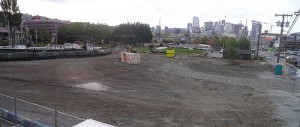LIVING IN MY BROWSER
/
I don't generally make futurist-style statements, but the last two days are begging for one: A big piece of Web 3.0 is going to be the transition from "Live in your In-Box" to "Live in your Browser." The quote "I live in my in-box" came from a participant in a workshop I co-presented with Scott Schnaars of Socialtext. We were talking about the value and methods of moving from an email centric workflow to one more focused on portals and collaboration workspaces (building from my Kill Email post). The idea isn't that the work we do while "in our in-box" isn't valuable -- it is real work: we are often communicating about projects, ideas, etc. The idea is that the in-box work carries with it more overhead than the same work would if it were done within a project workspace.
Moving into your browser may be a more efficient place to be, and Gen Y may be there ahead of us. Gen Y doesn't have to unlearn our (Baby Boomer) email habits.
The other event that pushed me to join the futurists was a discussion I had with Caleb Carter, CEO and Founder of ExistInts. ExistInts joins Google, Facebook, and many others in trying to provide you with a new web home. ExistInts adds a local flavor, while also striving to cross work and social boundaries -- smart as many of us have woven our work and social networks and activities together already. Having a "home" that is built to support that model makes sense.
The organizational question is what is the right level? Your social network does provide you work value, and vice versa. These are going to be tied together in our workspace. Should organizations be building portal homes at a company level or at the level of the project? Should individuals be building their own portal homes with rooms for work and play?


http://www.flickr.com/photos/nwseaport/ / CC BY 2.0
I feel like we are at the stage of construction where the ground has been cleared and the materials are beginning to arrive. Google is gearing up (pun intended) with Google Wave and the Chrome OS:We designed Google Chrome for people who live on the web — searching for information, checking email, catching up on the news, shopping or just staying in touch with friends. However, the operating systems that browsers run on were designed in an era where there was no web. So today, we're announcing a new project that's a natural extension of Google Chrome — the Google Chrome Operating System. It's our attempt to re-think what operating systems should be... while smaller firms like Socialtext and ExistInts are providing purpose-built capabilities. We all need to consider what's going to make the best neighborhood and architecture for getting our work done. I'm sure it's going to be in the browser. Have you already moved? In my case, I think I've moved, but haven't completely unpacked. Email still makes up the majority of my work communication and my organization has not yet taken the big step to a web-based workflow. Suggestions appreciated from those of you who've moved, unpacked, and finished putting up your pictures.







